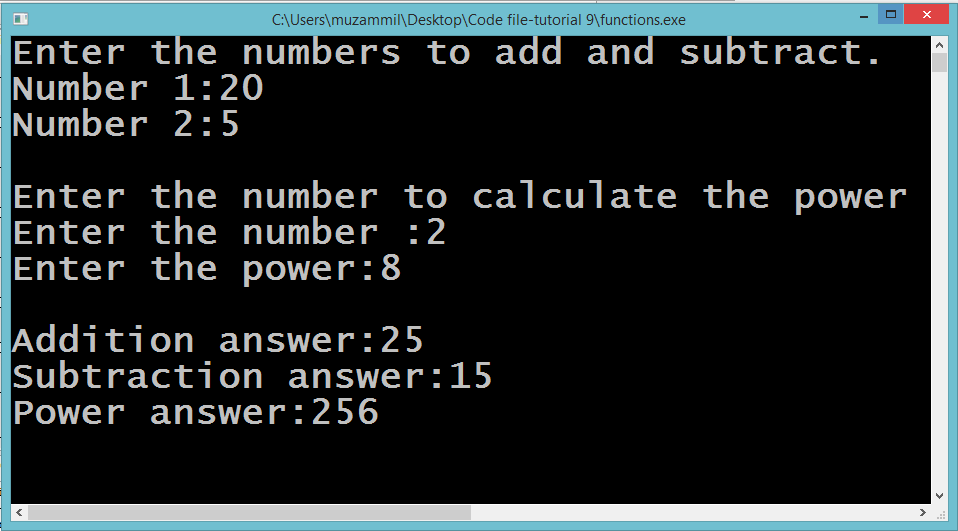Introduction to Functions
Submitted by Muzammil Muneer on Saturday, September 20, 2014 - 01:58.
Introduction to Functions
In this part you will learn: 1. C syntax 2. Functions 3. Function Calling 4. Function definition 5. Function prototype 6. Showing outputWhat is a Function?
In C, a function is a group of statements that together performs a task. Every C program has at least one function called the ‘main()’ function. It is the heart of the program. Functions divide your code into separate small parts so that the code is easier to understand and easier to write. Each function performs a specific task based on its usage. The C language relies very much on function. The C standard library provides numerous built-in functions that your program can use. A function can be of different types. i.e. it can either have a return type, a name and some parameters or it can have no return type ‘ void’ and a name and parameters or it can only have a name but no return type or parameters. There is no restriction on the number of parameters a function can have. Calculating through Functions Basic Step: Open Dev C++ then File > new > source file and start writing the code below. These two are the most common and basic header files. The first one stdio.h is used to grant us most of the basic functions of C like Input and Output functions. The second one conio.h provides us functions like getch() which is used to pause our screen until we press a button.- #include<stdio.h>
- #include<conio.h>
- int AddNumbers(int m1,int n1);
- int SubNumbers(int m1,int n1);
- int calculatePower(int n,int p);
Now we enter our main() function. Here we first declare some integers and take input in them from the user. After taking the input comes our first function call. When we write the name of our function in the main function that is called function calling. When we call a function we send in the variables as parameters that we need to send in order to perform our required task.
When we call a function the control of our program goes inside the function. The body of the function is executed first and then the program returns to the main and the rest of the program is then executed.
Now when we called the function we sent the numbers in the function as parameter the afterward the function returns the answer. Same is the case with the other function call.
In this piece of the code we declared two more variables. These variables are for calculating the power of user entered number. We took input the number and the power from the user. Then we called the power function and sent the number and the power as the parameter. This function will calculate the power and return the ans which will be stored in the ans3 varibale.
At the end of thr program we just printed our three answers on the screen and called the getch() function which pauses the console screen.
- int AddNumbers(int m1,int n1)
- {
- int answer= m1+n1;
- return answer;
- }
- int SubNumbers(int m1,int n1)
- {
- int answer= m1-n1;
- return answer;
- }
- int calculatePower(int n,int p)
- {
- int product=1,i;
- for(i=0;i<p;i++)
- {
- product=product*n;
- }
- return product;
- }

